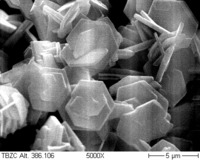
Photo from wikipedia
This study investigated dietary supplementation with Bacillus subtilis (BS) ATCC19659 on growth performance, biochemical indices, intestinal morphology, and cecum microflora in broiler chicks. A total of 600 Arbor 1-day Acres… Click to show full abstract
This study investigated dietary supplementation with Bacillus subtilis (BS) ATCC19659 on growth performance, biochemical indices, intestinal morphology, and cecum microflora in broiler chicks. A total of 600 Arbor 1-day Acres broilers of either sex were allotted to 5 treatments: chicks were fed a corn- and soybean-based diet (CON); chicks were fed basal diet containing 500 mg ZnB/kg (ZnB); chicks were fed basal diet containing 1 × 108 CFU/g feed of BS-ATCC19659 (BS-1); chicks were fed basal diet containing 3 × 108 CFU/g feed of BS-ATCC19659 (BS-3); and chicks were fed basal diet containing 5 × 108 CFU/g feed of BS-ATCC19659 (BS-5). Each treatment comprised 6 replicates with 20 birds for each replicate pen. Chicks in the BS-5 and BS-3 groups had higher body weight at the 21st and 42nd days and average daily gain from 1 to 21 days than that in the CON group (p < 0.05). Chicks in the BS-5 and ZnB groups had higher serum antioxidant activities and immunity response than those in the CON group (p < 0.05). Compared with the CON group, the liver mRNA abundance of GHR, TGF-β, IGF-1, IFN-γ, SOD, CAT, and GPX of chicks in three BS groups and the ileum villus length (μm) of chicks in BS-3 and ZnB groups was increased (p < 0.05). Compared with the CON group, the villus height-to-crypt depth ratio of the ileum of chicks in the BS-5 and BS-3 groups and the crypt depth and villus height-to-crypt depth ratio of the jejunum in the BS-5 and ZnB groups were increased (p < 0.05). The abundance of the Cyanobacteria phyla in the cecum decreased in response to treatment with both BS-ATCC19659 and ZnB groups (p < 0.05). Compared with the CON group, the cecum abundance of genera GCA-900066575 (Lachnospiraceae), Anaerofustis, and Papillibacter (Firmicutes phylum) in three BS groups were increased (p < 0.05); The abundance of genus Escherichia–Shigella reduced in the BS-3 group (p < 0.05). Compared with the CON group, the cecum abundance of genus Clostridia_unclassified in ZnB and BS-5 groups was decreased (p < 0.05) of broilers. Generally, Bacillus subtilis ATCC19659 as feed additive positively affected growth performance, immunity response, and cecal microflora of broilers.
Journal Title: Frontiers in Microbiology
Year Published: 2021
Link to full text (if available)
Share on Social Media: Sign Up to like & get
recommendations!